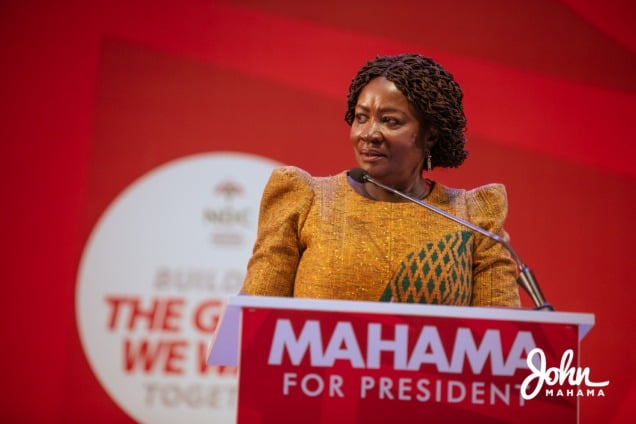Professor Jane Naana Opoku-Agyemang, the running mate of the National Democratic Congress (NDC), has underscored the urgent need for reform in the approach to illegal mining, locally known as ‘galamsey.’ At an NDC gathering in Amenfi Central, situated in the Western North Region, she articulated the party’s commitment to developing a sustainable framework for mining that prioritizes environmental conservation and community well-being. Opoku-Agyemang pointed out the socio-economic factors driving young individuals toward galamsey, particularly the lack of viable employment opportunities available under the current administration. She emphasized that the prevalence of illegal mining, while a longstanding issue in Ghana, has been exacerbated by a failure to provide adequate jobs, urging that the youth need alternatives to ensure both their livelihoods and the protection of their environment.
Opoku-Agyemang proposed that an NDC-led government would not penalize those engaged in illegal mining; rather, it would invest in training programs to teach miners safe and responsible mining techniques that mitigate environmental degradation. In her view, the conventional perception of miners as lawbreakers overlooks the stark realities many face in their pursuit of survival amidst scarce job prospects. She expressed her dedication to facilitating a positive transformation in mining practices that allow for financial gain without compromising community health or ecological integrity. Opoku-Agyemang’s message resonated with many in her audience, as she conveyed her party’s willingness to engage with miners in a constructive dialogue aimed at fostering responsibility and environmental stewardship.
The debate around galamsey has gained prominence in Ghana, with varying opinions on how the government should approach this issue. Dr. Ayew Afriyie, a Member of Parliament from the ruling New Patriotic Party (NPP) and Chairman of the Health Committee, weighed in by asserting that the government has no plans to ban galamsey activities outright. His rationale is rooted in the recognition that many individuals in mining communities rely heavily on illegal mining for their livelihoods, making any prohibition politically contentious. Dr. Afriyie’s remarks indicate a pragmatic approach that weighs political implications against the immediate need for economic stability in these communities. He also accused the NDC of attempting to destabilize the mining sector by allegedly importing foreign nationals to engage in illegal mining, painting the opposition in a negative light.
As both the NPP and NDC gear up for the upcoming December elections, the stakes regarding galamsey have intensified. Civil society groups have been ramping up pressure on both parties to take meaningful action to address the environmental consequences stemming from illegal mining. The environmental degradation linked to galamsey—such as deforestation, water pollution, and habitat destruction—has prompted widespread public concern, emphasizing the need for a responsible approach that balances economic needs with ecological preservation. Therefore, political candidates are now under scrutiny to present comprehensive strategies that demonstrate their commitment to environmental health while also addressing the economic realities that drive individuals to participate in illegal mining.
The NDC seems to be positioning itself as a responsible alternative, offering a vision for responsible mining that resonates with the populace’s desire for jobs and environmental preservation. Opoku-Agyemang’s advocacy for education and training for miners is an approach rooted in practicality, aiming to elevate the standards of mining and protect Ghana’s natural resources. By taking into account the socioeconomic drivers of illegal mining, the NDC hopes to present an inclusive plan that acknowledges the challenges faced by miners while providing viable economic alternatives. This approach contrasts with the NPP’s current stance, illustrating a distinct ideological divide between the parties regarding how to tackle the multifaceted issues surrounding galamsey.
The ongoing discourse between the two major political parties highlights the broader implications of illegal mining on Ghana’s socio-economic landscape. As both sides rally for support ahead of the election, the dire need for practical solutions becomes increasingly apparent. Many are looking for commitments to sustainable development initiatives that can empower local communities while safeguarding the environment. The NDC’s framework, as articulated by Opoku-Agyemang, resonates with those who seek to reconcile the urgent need for jobs with the overarching goal of environmental conservation. Their focused approach on training and practical solutions may appeal to voters who are increasingly aware of the ecological damages linked to galamsey and are demanding actionable plans from their leaders.
In conclusion, the debate surrounding illegal mining poses critical questions for Ghana’s future development trajectory. With heightened awareness of environmental issues among the electorate, political parties like the NDC are recognizing the significance of addressing youth unemployment while ensuring sustainable practices in mining. As the December elections draw near, the pivotal nature of the galamsey debate may serve as a litmus test for candidate accountability and commitment to progressive socio-economic reforms. The NDC’s pledge to empower miners through education represents a constructive path forward that could establish a precedent for responsible mining practices, ultimately benefiting both local communities and the nation’s ecological heritage.


